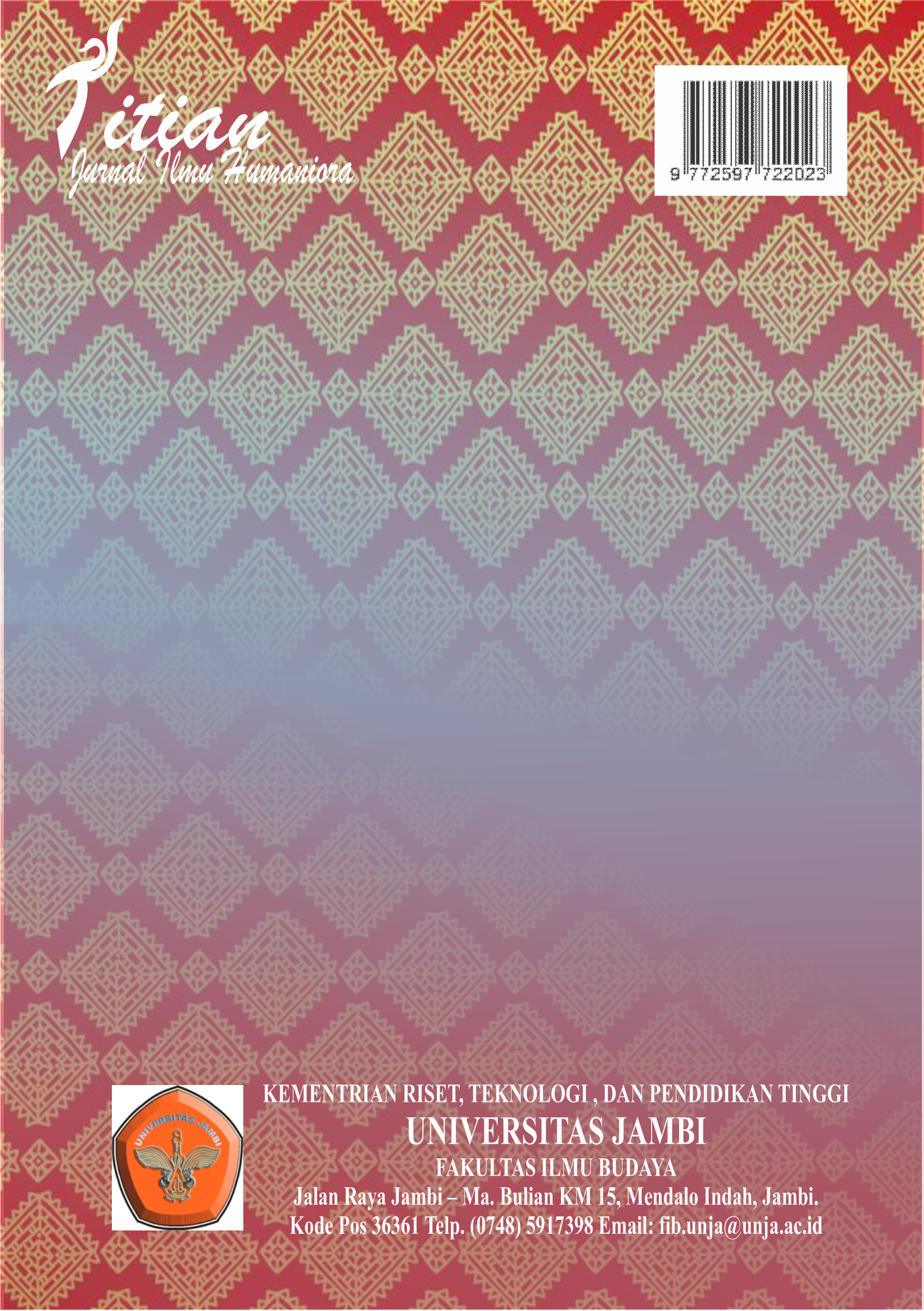Pengembangan Ilmu di Era Transformasi Digital
DOI:
https://doi.org/10.22437/titian.v6i2.20390Kata Kunci:
Transformasi digital, Kemandirian belajar, Berpikir tingkat tinggi, Partisipasi pembelajaranAbstrak
Artikel ini membahas tentang tantangan di era transformasi digital bagi siswa-siswa sekolah dan mahasiswa. Revolusi Industri 4.0 telah memasuki tahapan lanjut. Teknologi digital, BIG DATA, bisnis teknologi terus berkembang dan semakin bervariasi. Dengan demikian, sumber-sumber belajar tersedia luas yang dapat diakses melalui teknologi informasi. Generasi muda jaman sekarang memiliki kebebasan yang lebih luas untuk mengakses informasi dan menggunakan layanan tersebut. Dengan demikian dibutuhkan generasi muda yang memiliki kecakapan dalam menggunakan informasi tersebut untuk meningkatkan kemampuan. Generasi muda jaman sekarang dituntut untuk memiliki kemampuan belajar mandiri. Siswa dan mahasiswa memiliki kebiasaan belajar mandiri akan lebih mudah memiliki sikap positif yang kuat dalam segala proses pembelajaran. Sikap positif mutlak diperlukan agar pembelajaran menjadi menyenangkan. Selain itu, partisipasi dan kontribusi atau keterlibatan aktif dalam proses pembelajaran di era transformasi digital sangat diperlukan. Maka dari itu, dalam mempersiapkan pembelajaran di sekolah maupun perkuliahan, siswa dan mahasiswa perlu menyiapkan diri dalam hal kompetensi, sikap dan mental dalam melakukan aktivitas pembelajaran, rasa tanggungjawab dalam kemandirian belajar, dan implementasi kemampuan berpikir kritis.
Unduhan
Referensi
Burkle, M. & Cobo, C. (2018). Redefining Knowledge in the Digital Age. Journal of New Approaches in Educational Research, 7(2), 79-80. https://doi.org/10.7821/naer.2018.7.294
Crawford, J., Butler-Henderson, K., Rudolph, J., & Glowatz, M. (2020). COVID-19: 20 countries' higher education intra-period digital pedagogy responses. Journal of Applied Teaching and Learning (JALT), 3(1). https://doi.org/10.37074/jalt.2020.3.1.7
Ermter, P.A., Addison, P., Lane, M., Ross, E., & Woods, D. (1999). Examining teachers' beliefs about the role of technology in the elementary classroom. Journal of Research on Computing in Education, 32(1), 54-72. https://doi.org/10.1080/08886504.1999.10782269
Ertmer, P. A. (2005). Teacher pedagogical beliefs: The final frontier in our quest for technology integration? Educational Technology Research and Development, 53(4), 25–39. https://doi.org/10.1007/BF02504683
Hadiyanto, Wulandari, S., Wilyanti, L. S., Supian, Afria, R., & Nazarudin. (2021). The Effective Use of Full Online Learning to Replace Classroom Learning During the Covid-19 Pandemic. International Journal of Current Research and Review, 23–32. https://doi.org/10.31782/IJCRR.2021.SP205
Harper, S. R. & Quaye, S. J. (2009). Beyond Sameness, with Engagement and Outcomes for All.In S.R. Harper & S.J. Quaye (Eds.). Student engagement in higher education: Theoretical perspectives and practical approaches for diverse populations (pp. 1-15). New York, NY: Routledge,
Hooper, S., & Rieber, L. P. (1999). Teaching, instruction, and technology. In A. C. Ornstein & L. S. Behar-Horenstein (Eds.), Contemporary issuesin curriculum (pp. 252-264). Boston, MA: Allyn and Bacon.
Kaur, G. (2020). Digital Life: Boon or bane in teaching sector on COVID-19. CLIO an Annual Interdisciplinary Journal of History, 6(6), 416-427.
Kearsley, G. & Shneiderman, B. (1998). Engagement Theory: A Framework for Technology based Teaching and Learning. Educational Technology, 38(5), 20-23. https://www.jstor.org/stable/44428478
Khaidir, F., Tersta, F. W., & Afria, R. (2020). Students’ Perception of Autonomous Learning Activities. J-SHMIC : Journal of English for Academic, 7(1), 66-76. https://doi.org/10.25299/jshmic.2020.vol7(1).4599
Kim, H. K., & Rissel, D. (2008). Instructors' integration of computer technology: Examining the role of interaction. Foreign Language Annals, 41(1), 61-80. https://doi.org/10.1111/j.1944-9720.2008.tb03279.x
Knowles, M. (1975) Self-directed learning: A guide for learners and teachers, New York: Cambridge Books.
Kuh, G. D. (2003). What we're learning about student engagement from NSSE: Benchmarks for effective educational practices. Change, 35(2), 24-32. https://doi.org/10.1080/00091380309604090
Lee, S.D. (2001). Digital Imaging: a practical handbook. London: Facet Publishing.
Mailizar, Almanthari, A., Maulina, S., & Bruce, S. (2020). Secondary school mathematics teachers’ views on e-learning implementation barriers during the Covid-19 pandemic: The case of Indonesia. Eurasia Journal of Mathematics, Science and Technology Education, 16(7). https://doi.org/10.29333/ejmste/8240
McDonald, M. & Roswell-Jones, A. (2012) The Digital Edge: Exploiting Information & Technology for Business Advantage, Gartner Inc.
Meng, L., Zhang, Z., Lei, M., Liu, Y., Liu, T., & Jin, C. (2019) Relationship between self-directed learning readiness, learning attitude, and self-efficacy of nursing undergraduates. Frontiers of Nursing, 6(4), 341 – 348. https://doi.org/10.2478/FON-2019-0043
Mugge, P., & Gudergan, G. (2017) The Gap Between the Practice and Theory of Digital Transformation, Whitepaper in: The 50thHawaiian International Conference of System Science.
Norton, S., McRobbie, C. J., & Cooper, T. J. (2000). Exploring secondary mathematics teachers' reasons for not using computers in their teaching: Five case studies. Journal of Research on Computing in Education, 33(1), 87-109. https://www.learntechlib.org/p/92142/
Prihatin, P.N. (2012) The Computer Integration Into the EFL Instruction in Indonesia: An Analysis of Two University Instructors in Integrating Computer Technology Into EFL Instruction to Encourage Students' Language Learning Engagement. Dissertations. 380. https://ecommons.luc.edu/luc_diss/380
Stolterman, E. & Fors, A. (2004) Information technology and the good life, Information Systems Research, 687–692. https://doi.org/10.1007/1-4020-8095-6_45
Tekkol, A. & Demirel (2018) An Investigation of Self-Directed Learning Skills of Undergraduate Students, Frontiers in Psychology, 9, 1 – 14. https://doi.org/10.3389/fpsyg.2018.02324
Toquero, C. M. (2020). Challenges and opportunities for higher education amid the COVID-19 pandemic: The Philippine context. Pedagogical Research, 5(4). https://doi.org/10.29333/pr/7947
Vega, N.D. & Arifin (2016) Penerapan Self Directed E-Learningpada Keterampilan Menyimak, Jurnal Masyarakat Telematika dan Informasi, 7(2), 107-118
Vygotsky, L.S. (1978). Mind and society: The development of higher psychological processes. Cambridge, MA: Harvard University Press
Warschauer, M. (2000).On-line learning in second language classroom: An ethnographic study.In M. Warschauer & R. Kern (Eds.), Network-based language teaching: Concepts and practice (pp. 41-58). Cambridge, UK: Cambridge University Press.
Zinder, E. & Yunatova, I. (2016) Synergy for digital transformation: person’s multiple roles and subject domains integration, Digital Transformation and Global Society, 155–168. https://doi.org/10.1007/978-3-319-49700-6_16
Unduhan
Diterbitkan
Cara Mengutip
Terbitan
Bagian
Lisensi
Hak Cipta (c) 2022 Pius Nurwidasa Prihatin

Artikel ini berlisensiCreative Commons Attribution-ShareAlike 4.0 International License.































